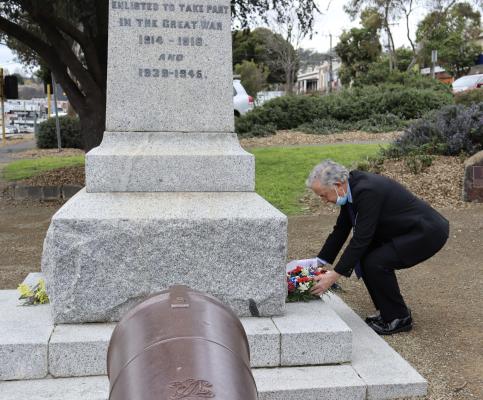
By Mikayla van Loon
Wednesday 18 August marked the 55th anniversary of the Battle of Long Tan during the Vietnam War – the deadliest day for Australian soldiers during the decade-long battle.
It is also the day which commemorates the service of all those who served in Vietnam, known as Vietnam Veterans Day.
For Lilydale veterans Tony Walters, Frank Archer, Bob Richardson and Lilydale RSL president Bill Dobson, not being able to gather and honour those who served, as well as remember their own service and sacrifice was really difficult.
“It’s important to remember the guys from D Company 6 RAR. We lost 18 blokes that day. And also, it’s Vietnam Veterans Day so we think of all the guys that served and all the guys who died and suffered and got injured and all that sort of stuff,” Mr Dobson said.
Vietnam’s returning servicemen did not receive the respect nor honour they deserved until 14 years after they had hit home soil, leaving many hesitant to reveal they had served in the army.
“I spent several years trying to pretend that I was never in the army, I suppose. We weren’t very well received as is often mentioned nowadays but it’s true,” Mr Walters said.
“For some years, I would certainly never talk about it, I was ashamed of it actually. But I’m over that well and truly now and now I like to get involved with most things that are related.”
In 1987 Sydney held the first Vietnam veterans march and national celebration in recognition of Australia’s soldiers.
Mr Walters, Mr Dobson, Mr Archer and Mr Richardson each said they were still wary of being known as soldiers even after the 1987 march but have since come to feel more respected.
“I think now it is completely different we’re sort of respected now, and we just hope now too with the recent developments with the Afghanistan situation, those blokes will feel pretty terrible at the moment like we felt at the time when the nation pulled out,” Mr Dobson said.
“So, let’s hope that everyone treats them a bit better than the way they treated us.”
Like with Vietnam and as Mr Archer said, with all wars, there was and always will be controversy.
“I think with any war, it’s not the best place to be and those that don’t fight in the war will never understand,” Mr Archer said.
Tending not to remember the negative parts of the war, on days like Vietnam Veterans Day commemorations are then followed by meet ups with fellow unit members and friends.
“What most of us tend to do in my experience is, when we do get together we share the positive experiences,” Mr Walters said.
“You become pretty close to the people you’re with in a place like that [Vietnam].”
For Mr Walters the excitement of joining the army soon wore off but he will always remember it as the first time he flew in a plane.
“You tend to think more of the funny things that might have happened rather than the other stuff,” Mr Dobson said.
“We’re on patrol once and my job was to crawl out and set up the claymore mine for an ambush and the other guy was supposed to set up the tripwire.
“Anyway, we went together and we set up his tripwire, and I went a bit further and set the claymore mine up and he said ‘whatever you do, follow me back’.
“He tripped over his tripwire and flares went up and all hell broke loose. And you look back and it’s funny, but at the time it wasn’t.”
Mr Richardson was stationed in Saigon in the signals bunker, where he completed 12 hour shifts, two days and two nights before getting three full days off.
“Life in Saigon was fairly good, it was what you made out of it. I used to just jump in the American helicopters and disappear for two or three days.”
All of these men were conscripted to the army but were convinced to volunteer in the war.
“I don’t know that there were a lot of conscripts that served that didn’t volunteer in some form or other. Volunteering was probably more like coercion. I suppose you could say, ‘I didn’t not volunteer’,” Mr Walters said.
“The other thing was in those days they convinced you that it was the right thing to do. They would say how the Viet Cong were killing people, and villages so you think well, you’re right to get involved, so you say I’ll volunteer for that,” Mr Dobson said.
“And you go along with it, but of course, when you look back at history now it was a civil war.”
Upon returning home, Mr Archer, Mr Dobson, Mr Walters and Mr Richardson fell back into their normal lives working at printing presses, in engineering, at ABC radio and with Australia Post.
Mr Dobson and Mr Archer even went on to start their own businesses before retiring.
“One thing the army did for us was taught us how to look after ourselves, there was a lot of discipline,” Mr Archer said.
Tony Walters served in the Headquarters Company ATF from 1970 to 1971. Frank Archer served in the 3rd Battalion RAR in 1968.
Bob Richardson served in 1106 Signal Squadron from 1968 to 1969. Bill Dobson served in 10FP Combat Supply in 1969.
D Company 6RAR received the Australian Unit Citation for Gallantry and was also acknowledged by the United States and South Vietnam with Presidential Citations from both nations for their courage.







